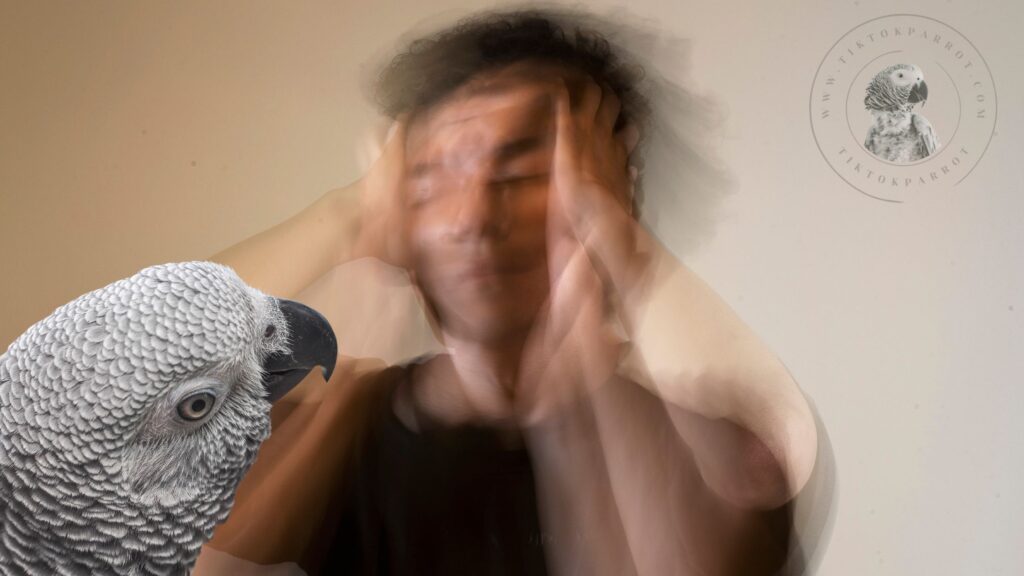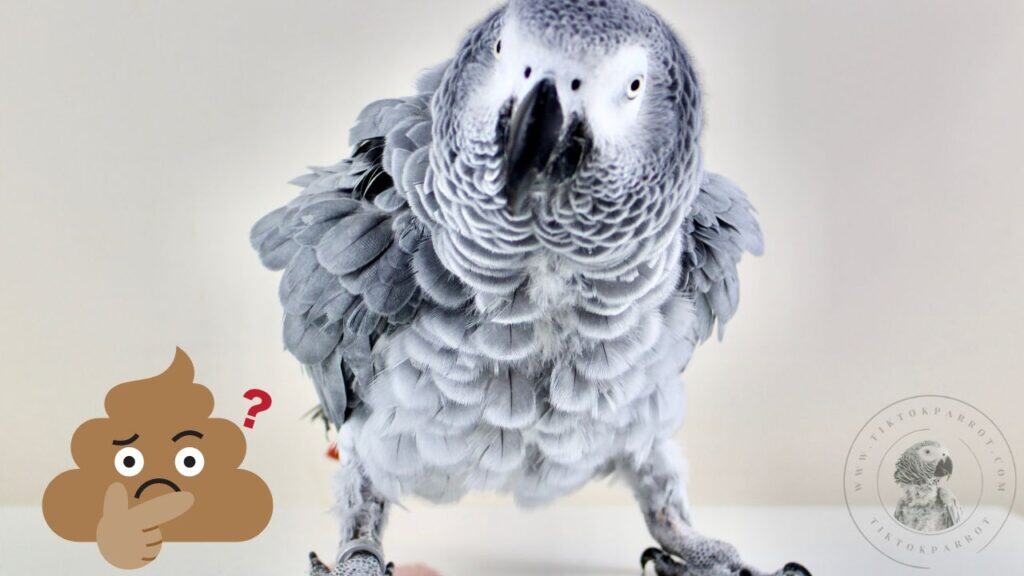Have you ever seen into the cage of your beloved African Grey, only to be met with a puddle of watery poop that looks more like a miniature swimming pool than a natural byproduct of digestion? You’re not alone! Many of us have been there, done that, and got the t-shirt (which, let’s be honest, is probably stained with said watery poop).
But don’t worry today we’re about to embark on a thrilling adventure to uncover the reasons behind this watery wonder and, more importantly, what to do about it. So, as usual grab a cup of coffee, get comfy, and let’s dive into the fascinating world of African Grey poop (who knew that was a thing?). 😉
The Great Poop-tastrophe: Decoding the Droppings
Let’s jump into the fascinating, albeit slightly messy, world of African Grey parrot droppings. Unlike their human companions, our avian buddies don’t produce separate waste products. Instead, they expel a combination of urine and feces, resulting in that, well, watery consistency.
But hold on, a little water isn’t necessarily cause for alarm. Just like us, their poop can change depending on their diet, hydration levels, and even stress. However, if the watery situation becomes a recurring theme (think daily downpours in your parrot’s cage), then it’s time to become a poop detective and sniff out the culprit.
The Usual Suspects: Common Causes of Watery Poop

Before we start pointing fingers, let’s acknowledge that African Greys are intelligent, social, and emotional creatures. Their digestive system is as unique as they are, and sometimes, things just don’t go as planned.
So, what could be causing your African Grey’s sudden fascination with creating miniature mudslides? Here are some common culprits behind the watery poop phenomenon:
- Dietary Delights (or Disasters): A diet rich in fruits and veggies can lead to an increase in water content. Now, before you start thinking, “Ah, I’ll just cut back on the produce,” remember that a balanced diet is crucial for your feathered friend’s overall health. Instead, consider adjusting the portion sizes or introducing more nutrient-dense foods.
- Dietary Drama: Just like us, what goes in must come out! If your parrot’s diet is heavy on juicy fruits and veggies, their droppings will naturally be more watery. Think about it – have you ever seen a solid output after a watermelon feast? Probably not. A good balance of pellets, nuts, seeds, and fresh produce is key.
- Hydration Station: While staying hydrated is essential for our feathered friends, excessive water intake can lead to, you guessed it, watery droppings. Ensure they have fresh, clean water readily available, but avoid overdoing it with misting or baths. Sometimes, our little friends can get a bit too enthusiastic with their hydration, leading to, you guessed it, watery poop.
- Stress Less, Poop Less: African Greys are sensitive to stress, which can manifest in various ways, including changes in droppings. If you’ve recently introduced a new pet, person, or even a new toy, it might be causing your parrot some anxiety. Just like humans get the runs before a big presentation, African Greys can experience stress-induced watery poop. New environments, loud noises, or even changes in their routine can trigger this reaction. Providing a comfortable, familiar space and minimizing stressors is crucial.
- Parasites and Bacterial Infections: Let’s not sugarcoat it – sometimes, watery poop can indicate underlying health issues like parasites or bacterial infections. If you suspect this might be the case, a trip to the vet is essential.
- Medical Mysteries: In some cases, watery poop can be a sign of an underlying medical issue, such as gastrointestinal problems or infections. If you’re concerned, it’s always best to consult with your avian veterinarian.
The Poop Patrol: What to Do About Watery Droppings

Now that we’ve covered the possible causes, let’s get down to business and explore some solutions:
- Keep it Clean: Regularly clean your parrot’s cage, food, and water areas to prevent bacterial growth and reduce stress.
- Dietary Adjustments: Work with your avian veterinarian to create a customized diet plan that meets your parrot’s unique needs.
- Hydration Hacks: Try using a water bottle with a sipper tube or a heavy ceramic dish to reduce spills and messes.
- Stress Reduction Techniques: Provide plenty of toys, rotate them regularly, and engage in playtime activities to keep your parrot happy and stimulated.
- Monitor and Report: Keep an eye on your parrot’s droppings and consult with your veterinarian if you notice any unusual changes or persistent watery poop.
Again remember, If the watery situation persists or you suspect something more serious, don’t hesitate to schedule a checkup with your avian vet. Early detection and treatment are key to maintaining your parrot’s health.
Patience is a Poop Virtue
Change doesn’t happen overnight, especially when it comes to… well, you know. Be patient, consistent, and celebrate small victories. A little watery poop here and there is normal, but if it becomes a chronic issue, implementing these solutions should help achieve a more solid situation (pun intended!).
Healthy African grey droppings
Healthy African Grey droppings will typically consist of three parts:
- Feces: This is the solid, dark green or brown matter that results from digested food. The color can vary slightly depending on their diet, with more seeds leading to greener droppings and pellets causing browner tones.
- Urates: This white to cream-colored, almost chalky material is a byproduct of the kidneys.
- Urine: This is a clear liquid waste product also excreted by the kidneys.
All three components come together to form a single dropping, often described as having a consistency similar to soft-serve ice cream (though hopefully a bit less appetizing!). There should be a minimal amount of liquid surrounding the solid matter, and the overall dropping shouldn’t have a strong odor.
Here’s a quick breakdown:
- Color: Dark green, brown, or a combination (depending on diet)
- Consistency: Solid but somewhat soft, like soft-serve ice cream
- Odor: Little to no odor
- Composition: Solid feces with white/cream urates and clear urine
Blood in African grey parrot droppings
The presence of blood in your African Grey’s droppings is a cause for concern and shouldn’t be ignored. Here’s why:
- Blood in stool can indicate several potential issues: It could be a sign of irritation or inflammation in the digestive tract, ulcers, internal parasites, or even a bacterial infection.
- Severity can vary: The amount and color of the blood can offer some clues about the severity. Fresh red blood might indicate bleeding in the lower intestines, while dark red or maroon blood suggests bleeding higher up in the digestive system.
What to do:
- Don’t delay! If you notice blood in your African Grey’s droppings, it’s crucial to schedule an appointment with your avian vet as soon as possible. Early detection and treatment are essential for a healthy recovery.
- The vet will likely perform a thorough examination: This might include collecting a fecal sample for analysis, blood tests, and potentially X-rays or other imaging techniques to pinpoint the cause of the bleeding.
- Treatment depends on the underlying cause: Based on the diagnosis, your vet will recommend the appropriate course of treatment, which could involve medication, dietary changes, or even surgery in severe cases.
Here are some additional points to remember:
- Don’t self-medicate: Never give your parrot any medication without consulting your vet.
- Monitor closely: While you wait for your appointment, keep a close eye on your African Grey’s droppings and overall behavior. Note any changes in appetite, activity level, or droppings frequency.
By taking swift action, you can help ensure your feathered friend receives the necessary care and gets back to their healthy, happy self.
My Final Thoughts
There you have it, my dear readers! The mystery of African Grey watery poop has been solved (or at least, we’ve made some progress). Remember, every parrot is unique, and what works for one might not work for another. By understanding the possible causes and taking proactive steps, you can help your feathered friend feel more comfortable and reduce the likelihood of watery droppings.
Let’s Chat Poop!
We all know poop isn’t the most glamorous topic, but it’s an essential part of pet ownership. So, don’t be shy! Share your experiences and solutions in the comments below. Have you ever dealt with watery poop woes with your African Grey? What tricks did you use to achieve poop harmony? How did you tackle the issue?
If you found this blog helpful, It would be great if you could share it with your family and friends who might find it useful as well.
You might like to read these as well 🙂
Poop or Perch: Understanding Your Parrot’s Bathroom Body Language
The Scoop on African Grey Parrot Poop: A Fascinating Guide for Pet Owners
Food vs. Pellets – Why Food Is Better Than Pellets?
Frequently Asked Questions About African Grey Parrots
For more useful content about African grey parrots, you can subscribe my site with your email to get notification upon publishing a new blog, the subscribe box you can see on the right side of this page. Also if you get an alert on your web browser while browsing my site, allow it and that will also give you an alert whenever I publish a new blog. 🙂
Stay safe and much love!



